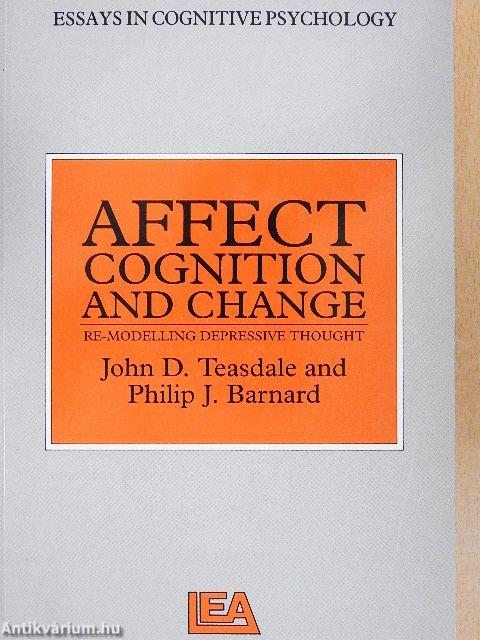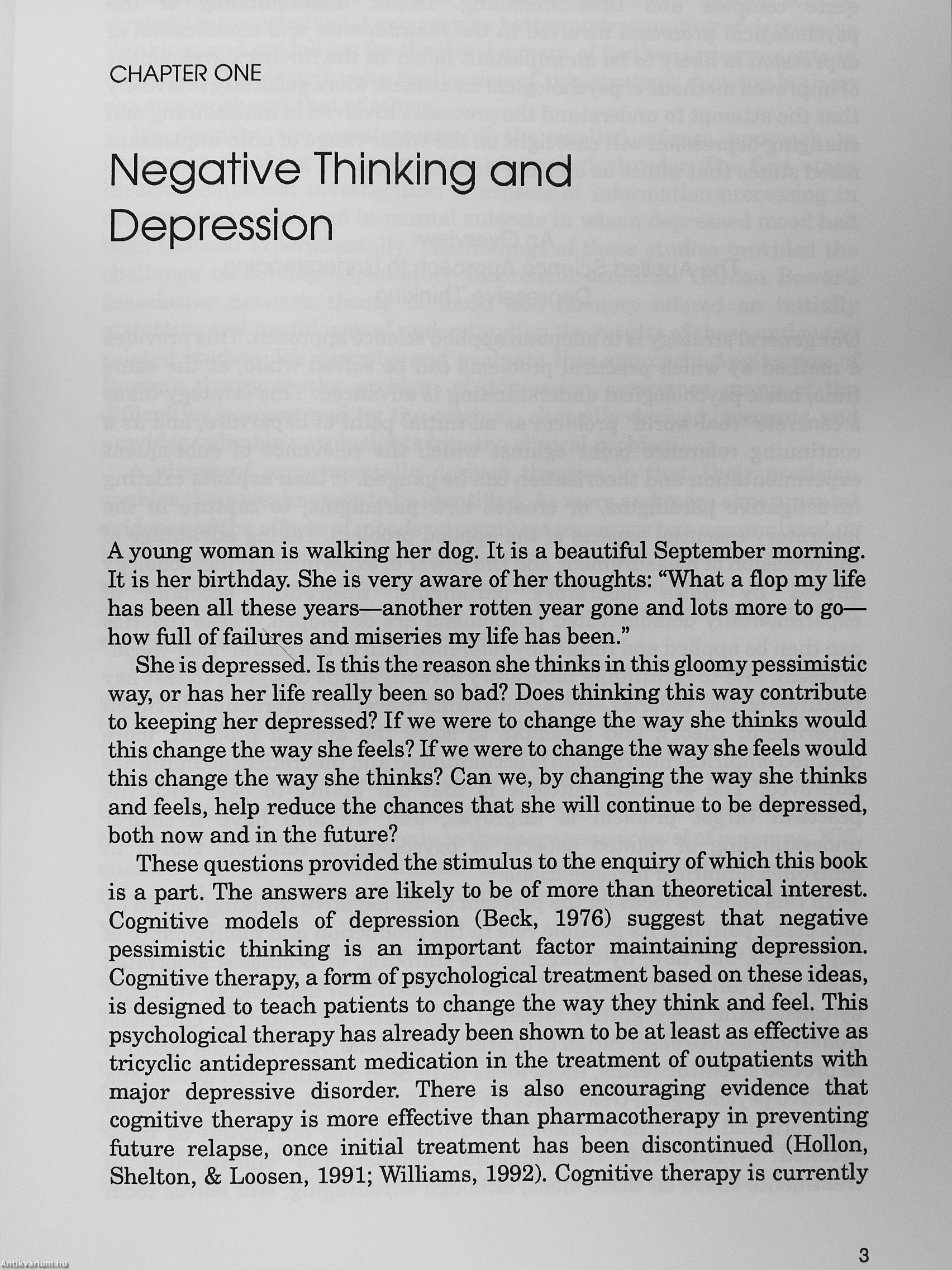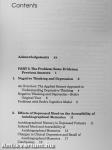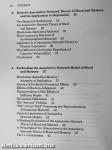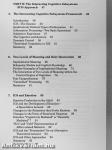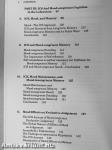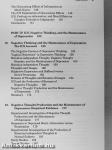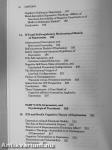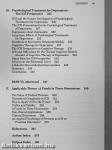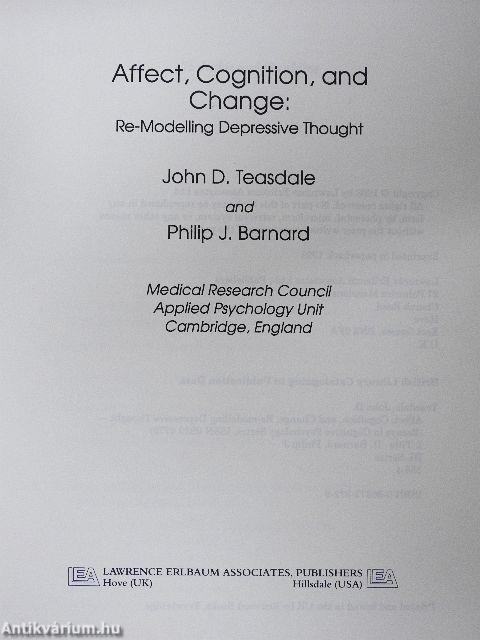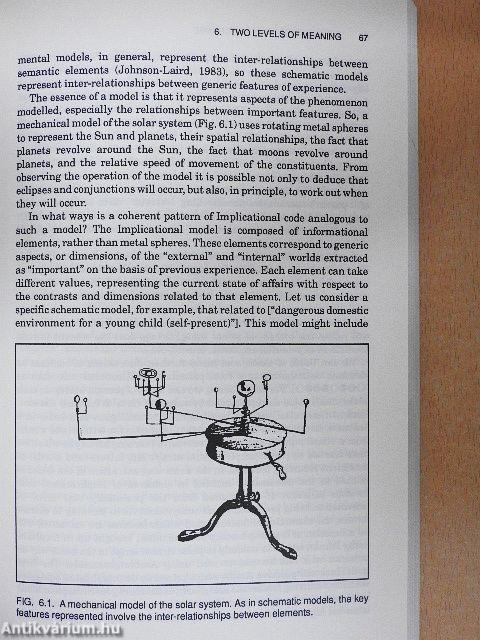1.104.039
kiadvánnyal nyújtjuk Magyarország legnagyobb antikvár könyv-kínálatát

VISSZA
A TETEJÉRE
JAVASLATOKÉszre-
vételek
Affect, Cognition, and Change
Re-Modelling Depressive Thought/Medical Research Council Applied Psychology Unit, Cambridge, England
| Kiadó: | Lawrence Erlbaum Associates, Publishers |
|---|---|
| Kiadás helye: | Hove-Hillsdale |
| Kiadás éve: | |
| Kötés típusa: | Varrott papírkötés |
| Oldalszám: | 285 oldal |
| Sorozatcím: | Essays in Cognitive Psychology |
| Kötetszám: | |
| Nyelv: | Angol |
| Méret: | 23 cm x 15 cm |
| ISBN: | 0-86377-372-9 |
| Megjegyzés: | Fekete-fehér ábrákkal. |
naponta értesítjük a beérkező friss
kiadványokról
naponta értesítjük a beérkező friss
kiadványokról
Előszó
TovábbFülszöveg
AFFECT, COGNITION, AND CHANGE; Re-Modelling Depressive Thought
Moods can powerfully bias what we think, remember, and perceive. This book focuses on the negative cognitive biases and thought patterns associated with depressed mood and addresses the questions: How is depressive thought to be explained? What is its role in the origins, maintenance, and treatment of clinical depression? Can experimental findings provide insights that complement and extend clinically derived cognitive models and therapies of depression?
A review of clinical, experimental, and theoretical approaches to understanding depressive thinking points to the inadequacies of existing explanatory accounts. The authors describe a radically new approach that overcomes these difficulties - Interacting Cognitive Subsystems (ICS). ICS provides a comprehensive framework for understanding cognitive-affective interaction and change. This approach recognises qualitatively different kinds of information that have... Tovább
Fülszöveg
AFFECT, COGNITION, AND CHANGE; Re-Modelling Depressive Thought
Moods can powerfully bias what we think, remember, and perceive. This book focuses on the negative cognitive biases and thought patterns associated with depressed mood and addresses the questions: How is depressive thought to be explained? What is its role in the origins, maintenance, and treatment of clinical depression? Can experimental findings provide insights that complement and extend clinically derived cognitive models and therapies of depression?
A review of clinical, experimental, and theoretical approaches to understanding depressive thinking points to the inadequacies of existing explanatory accounts. The authors describe a radically new approach that overcomes these difficulties - Interacting Cognitive Subsystems (ICS). ICS provides a comprehensive framework for understanding cognitive-affective interaction and change. This approach recognises qualitatively different kinds of information that have different relationships to affect. In particular, ICS distinguishes between two levels of meaning, one specific, the other more holistic, and suggests that only the more holistic level of meaning is directly linked to affect. This distinction enables ICS to provide an integrative account of the findings of experimental studies of mood-dependent cognition. It is also important in explaining the contrast between "hot" and "cold" cognition, "knowing with the head" versus "knowing with the heart", and in understanding central aspects of psychotherapeutic change. ICS is illustrated by application to studies of mood effects on memory and judgement, to negative thought production and its role in the maintenance of depression, and to cognitive-behavioural psychotherapy.
As well as providing a review of the current state of empirical and theoretical work in mood-dependent cognition, this book offers a new theoretical approach of wide relevance to understanding the interaction of cognition and emotion in both normal and clinical conditions.
This book represents a unique combination that has rarely if ever occurred before, in which one of our leading clinical psychologists has combined forces with one of our leading cognitive psychologists. a long-awaited marriage that was guaranteed to be productive with something of interest for the clinician and the researcher alike,
Mick Power, Royal Holloway University of London
The arena of cognitive-clinical psychology has been awaiting the entrance of a book such as this for some time. an extremely valuable contribution to a growing area. Tim Dalgleish, Institute of Psychiatry
This book represents a most impressive achievement. It is clearly the most sophisticated cognitive account of depression available, and the first to be integrated with a general model of cognitive functioning.
Chris Brewin, Royal Holloway University of London
Essays in Cognitive Psychology Series: Board of Advisors Alan Baddeley Max Coltheart Leslie Henderson Phil Johnson-Laird
ISBN 0-86377-372-9 ISSN 0959-4779 Vissza
Témakörök
- Idegennyelv > Idegennyelvű könyvek > Angol > Orvostudomány
- Pszichológia > Alkalmazott lélektan > Pszichotechnika > Egyéb
- Pszichológia > Idegennyelvű > Angol
- Pszichológia > Szociálpszichológia > Egészségpszichológia > Terápiák
- Orvostudomány > Ideg, elme > Diagnosztika
- Orvostudomány > Ideg, elme > Idegennyelvű
- Orvostudomány > Ideg, elme > Terápia
- Orvostudomány > Orvosi idegennyelvű könyvek > Ideg, elme
- Idegennyelv > Idegennyelvű könyvek > Angol > Pszichológia



